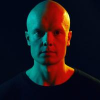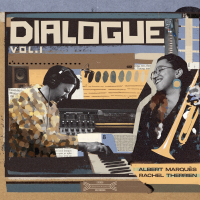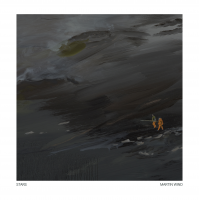Home » Jazz Articles » Album Review » Mats Eilertsen: Rubicon
Mats Eilertsen: Rubicon
Of course, Eilertsen's career was already in full motion by the time the new millennium came, with the bassist featured on recordings by guitarist Jacob Young (1998's Pieces of Time (Curling Legs)), pianist Maria Kannegaard (2000's Breaking the Surface (ACT)) and Nymark Collective (2000's First Meeting (Sonor))—all recordings which, in addition to others from the time, found the bassist already beginning to meet other musicians with whom he would regularly engage in later years, either as a member of their group(s) or they, as members of his own various projects.
Examining those three recordings, in fact, reveal a number of names now more internationally known, and with whom Eilertsen has subsequently recorded and/or toured in conjunction with releases on Munich's ECM Records: guitarist Young's Evening Falls (2004) and 2008 follow-up, Sideways; Nymark Collective pianist Tord Gustavsen's trilogy of (largely) quartet recordings, beginning with 2010's Restored, Returned and concluding with 2014's Extended Circle; and Kaanegaard Trio percussionist/drummer Thomas Strønen, whose 2006 quartet date, Parish, also included Eilertsen.
Another Young alum, Trygve Seim—with whom Eilertsen had also played on Young's Pieces of Time and a saxophonist that would become an internationally known name in his own right for his string of ECM recordings as a leader, beginning with the particularly groundbreaking, one-two punch of 2000's Different Rivers and 2005's equally superb Sangam—was already a band mate with Eilertsen in The Source, a collective quartet formed in 1993 in Trondheim (where they were studying) and which, in addition to a couple of Norway-only recordings, released its 2002 collaboration with the Cikada String Quartet on ECM, The Source and Different Cikadas, as well as its 2006 label follow-up, The Source.
That said, you won't find either Gustavsen or Young on Rubicon, the ultimate lesson in how music can evolve over time. The music for this record began life as a commissioned piece for the 2014 Vossa Jazz Festival. Further roadwork continued to alter the music's complexion until May, 2015, when Eilertsen and his band mates came together in Oslo's Rainbow Studios with ECM label head/producer Manfred Eicher and engineer Jan Erik Kongshaug. A collection of eight Eilertsen compositions, one improvised solo from pianist Harmen Fraanje (the miniature "Cross the Creek") and a collective piece of spontaneous composition from Eilertsen, reed/woodwind multi- instrumentalist Eirik Hegdal and American expat vibraphonist Rob Waring ("Wood and Water"), literally every musician on Rubicon has appeared in past non-ECM Eilertsen projects (and/or other groups in which the bassist performed, including singer Elin Rosseland's group, which also featured Waring), in particular: 2010's Elegy and 2013's Sails Set both come from the bassist's trio with Fraanje and Thomas Strønen; 2009's Radio Yonder, 2012's SkyDive and the SkyDive Trio's Sun Moee (2015)—all also on the Hubro imprint—feature various sized ensembles that all share guitarist Thomas T. Dahl (like Eilertsen and Hegdal, a Dingobats alum) and Finnish drummer Olavi Louhivuori in common.
There's even more cross-pollination to be found amongst Rubicon's seven members, though suffice to say that between decades of interaction in various contexts and, more importantly, time spent rehearsing, premiering and, finally, road-developing Rubicon before taking it into the studio has led to plenty of chemistry abounding throughout, permitting even music defined by considerable detail to breathe with the kind of interpretive élan that only musicians familiar with one another (and the music) can bring. The result is Eiltersen's most ambitious album to-date; certainly his largest, with only SkyDive's quintet coming close in size to this wonderfully constructed septet. Seim and Hegdal's two reeds and/or woodwinds conjoin with the grounded sound of Fraanje's grand piano or his more ethereal Fender Rhodes, which occasionally blends seamlessly with Waring's celestial vibes, all driven by Eilertsen's muscular yet eminently melodic bass lines and the blend of open-ended pulses and empathic percussive punctuations from the effortlessly fluid Louhivuori.
There are plenty of features for everyone—more, in fact, than Eilertsen features himself, though his robust tone and perfect rhythmic and harmonic choices remain both a constant and a definer throughout the set; but the true surprise—in particular, for those unfamiliar with his previous SkyDive work—is Dahl. While Dahl has already received some strong international praise for his work in Eilertsen's SkyDive Trio, quartet and quintet, his ECM debut may well be worth noting, as this is not the first time a guitarist of potential significance has appeared, relatively unknown, on an ECM recording surrounded by other potentially more well-known names.
Does Dahl possess the same promise as Bill Frisell did, when the American guitarist made his first international recording appearance on bassist Eberhard Weber's sublime 1979 ECM classic, Fluid Rustle? Only time will tell. But if Frisell's performance was notable yet also somewhat tentative, Dahl's work on Rubicon brims with confidence—his instrumental mastery matched only by his astute textural choices, whether it's weaving a melodic thread through a needle on Eilertsen's more harmonically challenging, expansively open "BluBlue" or proving himself capable of building much from relatively little on the rhythmically intensifying, change-light "September," where he boldly blends Frisell's sonic atmospherics with John Abercrombie's indescribable ability to sound fresh by never seeming to repeat himself...all the while evoking a collective result that sounds like nobody but Dahl.
This is not to suggest that Dahl supersedes the performances of his band mates; only that, with his relative anonymity and this being his first ECM release—and particularly fine showing that it is—Dahl may be the name many walk away from this recording thinking about most. That said, Waring—a more visible entity on the Norwegian scene, having played on nearly 40 recordings by artists ranging from Elin Rosseland and guitarists Jon Larsen and Jon Eberson to bassist Peter Opsvik, reed multi-instrumentalist Morten Halle (known for his work in Jon Balke's Magnetic North Orchestra and Oslo 13) and saxophonist Petter Wettre—not only shines in the solos he's afforded but as a context-setter of the highest order, whether it's his brief, soaringly resonant duo with Louhivuori on the harmonically implicit "Reminiscent" or his more oblique marimba work that helps keep the all-improvised "Wood and Water" as barely grounded as it is. And when the music opens up to allow him to more fully stretch out, as it does later on "Reminiscent..."or on "September," where Waring follows Dahl's already noted solo with an even more stellar turn of his own? Another name for those not plugged into the Norwegian scene to begin investigating, to be sure.
Fraanje, in addition to past work with Eilertsen, will be familiar to fans of Eric Vloeimans and the Dutch trumpeter's Fugimundi trio, as well as the pianist's ongoing collaboration with Dutch cellist Ernst Reijseger and African singer/percussionist Mola Sylla (heard on the 2013 Winter & Winter release, Down Deep), and his own releases on the Challenge label, including 2004's Sonatala and 2010's Avalonia, which augments his working trio with reed multi-instrumentalist Michael Moore - Clarinet. Here, Eilertsen features the pianist waxing sparingly on the rubato opener, "Canto," which also features some extraordinary clarinet work from Hegdal—ever-searching yet ever-aware of what's going on around him—and a rare but bar-raising opening solo from Eilertsen that says, in the space of just a few short minutes, why he is in such increasing demand from artists, beyond all those already mentioned, including ECM label mates Mathias Eick (2015's Midwest), Wolfert Brederode (2008's Currrents and 2011's Post Scriptum) and Nils Okland's exceptional new band, on its wonderful 2015 ECM debut, Kjølvatn.
Eilertsen's writing sometimes builds with almost pointillist detail. A relatively simple melodic line is carried by Seim and Hegdal on "BluBlue," as it moves gradually through a series of harmonic foundations and interpretive colorings by Waring, Fraanje and Dahl, its sometimes frenetic but always delicate rhythm kept moving inevitably forward by Eilertsen and Louhivuori. As important as he is an ensemble player on this date, Seim's recognizable bending of notes on his tenor and curved soprano horns—informed by significant time spent studying (and performing) in the Middle East—is also key to solo opportunities like "Balky," where the saxophonist delivers a particularly potent, extended solo that's a rare reminder of a player whose focus, in his own music, may be often more about writing than improvisational gymnastics, but whose work remains the consequence of an underlying virtuosity and rare attention to the purity of every note.
Alternatively, sometimes Eilertsen's music is predicated on relatively simple premises. "Lago," another lengthy feature for Fraanje, revolves around a relatively simple series of ascending chords, with a melody initially delivered by Fraanje over nothing but Waring's two-chords-to-the-bar marimba, but gradually assuming shape as Dahl begins overlaying sustaining, volume-swelled chords, while Louhivuori playfully engages with Eilertsen as Fraanje builds a superbly constructed solo, taking expressive liberties with tempo and harmonic centre before leading to Hegdal's clarinet solo, which blends jagged angularity and surprisingly moving melodism.
With an ensemble that rarely plays together in its seven-piece glory and, instead, provides grist for smaller musical permutations and combinations that, thanks to Eilertsen's astute choice of band members, cuts a broad textural swathe across his music, Rubicon is a largely introspective album with periodic moments of light shining through. More intrinsically challenging than his eminently accessible SkyDive Trio and quintet records, while taking greater risks it remains a compelling listen founded on Eilertsen's unerring love of a good melody, his appreciation for both a good groove and no groove, and a fondness for the open-ended improvisational opportunities that have defined much of his career.
Rubicon's greatest success is, in fact, that it manages to provide more complete freedom for the largest cast ever heard on an Eilertsen album, all while working with compositions that leaves plenty of memorable melodies in mind long after the player has stopped. He may not be a stranger to fans of the label for his nearly dozen appearances on albums by other artists, but with Rubicon, Eilertsen steps confidently up to the spotlight as leader, delivering an album that, with lessons learned from his existing body of work, opens his music up to even greater interpretive possibilities than ever before.
Track Listing
Canto; Cross the Creek; March; Balky; Lago; BluBlue; Wood and Water; September; Reminiscent; Introitus.
Personnel
Mats Eilertsen
bassTrygve Seim
saxophoneEirik Hegdal
saxophone, sopranoThomas Dahl
guitarRob Waring
vibraphoneOlavi Louhivuori
drumsHarmen Fraanje
pianoAlbum information
Title: Rubicon | Year Released: 2016 | Record Label: ECM Records
Tags
PREVIOUS / NEXT
Support All About Jazz
 All About Jazz has been a pillar of jazz since 1995, championing it as an art form and, more importantly, supporting the musicians who make it. Our enduring commitment has made "AAJ" one of the most culturally important websites of its kind, read by hundreds of thousands of fans, musicians and industry figures every month.
All About Jazz has been a pillar of jazz since 1995, championing it as an art form and, more importantly, supporting the musicians who make it. Our enduring commitment has made "AAJ" one of the most culturally important websites of its kind, read by hundreds of thousands of fans, musicians and industry figures every month.




























